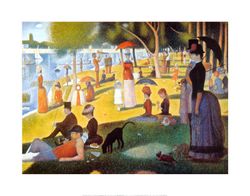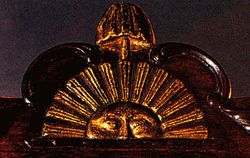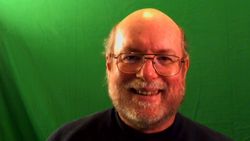Think of this as Volume 15, Number 51 of A-Clue.com, the online newsletter I've written since 1997. Enjoy.

Me. Not so much. (Pictured, of course, is Georges Seurat's "Sunday afternoon on the Island of Le Grand Jatte," the masterpiece hanging in the Art Institute of Chicago that inspired another masterpiece, Stephen Sondheim's "Sunday in the Park with George.")
It's not that I don't care. I have political views which I express often. It's just that I became convinced this year that politics matters less than I thought, and that in any case political change is baked-into our system.
Some may be surprised at both conclusions, so let's take the first one first.
Why doesn't it matter? Because in the end politics reacts to change, it doesn't lead it. I am utterly convinced, now, that economic change drives the American train.
-
The Civil War came about only after it became evident that machines could produce more than people. It was about the John Henry story, not Uncle Tom's Cabin.
-
Populists and progressives arose only after it became evident that utility markets needed regulation in order to deliver fixed-price inputs to mass manufacturing. J.P. Morgan worked on behalf of this change, not against it.
-
The New Deal arose after it became evident that production needed consumption or would inevitably result in deflation and disaster. FDR and Hitler were saying the same thing – buy.
-
The 1960s were not about social change, but economic change. Less Jim Morrison, more Apollo XI. Less Easy Rider, more Apple.

Renewable technologies are finally ready to take off. Convergence – the point at which renewable energy becomes the cheap energy – is definitely in sight. We get there through simple, predictable steps in technology, production, and the channel.
I'm reminded here of Benjamin Franklin looking at George Washington's chair as he prepared to sign the U.S. Constitution, the last great public act of his life. “I have the happiness to know that it is indeed a rising, not a setting sun."
My own prayer all year has been that, unlike Franklin, I might see more history. I have felt this way because 56 is that kind of an age, but also because I have felt, all my life, that I was rushing toward something, anxious for something important to begin, and terribly at odds with the times I was living in.
Through my whole adult life I've ridden a bicycle, and now I see bicyclists parade past my home every workday. Through my whole adult life I've lived in cities, and sought a place that might be walkable. The place I live has now become such a place. I have raised my children to prepare for big adventures that now lay before them.
I am content.
I know, now, how the story of our time comes out. There is no energy crisis. The Sun shines, the wind blows, the tides roll, and we live on a molten rock. Prosperity is coming.

As they do that, other problems that seem intractable today will fade into the background, become history, while new problems that we can't conceive of today will rise before them.
-
How do we go about really terraforming the planet, creating a stable ecosystem that is in concert with the way God made the world?
-
How do we end the present period of extinction and create biodiversity?
-
How do we get off this planet, permanently, and begin to explore the cosmos?
These are the questions of the 21st century, a century that only now has well and truly begun. They extend far beyond my days here. I won't see their answers. But what I know now, as 2011 comes to a close, is there will be answers.











Dana, I truly appreciate this post. It’s an excellent coda to 2011, during which I’ve spent far too much time following the antics the insane clown posse (those nattering nabobs of negativism) that the GOP has become, because they’ve done so much damage to our country and economy. (Just look at a chart of the 2011 S&P 500; in particular look at August.)
However, I’d like you to consider reformulating your first problem above. I would argue that we don’t need to “terraform the planet.” The planet is taking care of itself, as it has for billions of years. This time, it’s applying an intensifying heat treatment that will eradicate the source of inflammation, the carbon-burning human population. We need to adapt ourselves to our planet; we need to save ourselves unto the seventh generation.
Getting off the planet, permanently, may be, and should be, Plan B; having a home to come back to should be reinsurance, Plan C.
Dana, I truly appreciate this post. It’s an excellent coda to 2011, during which I’ve spent far too much time following the antics the insane clown posse (those nattering nabobs of negativism) that the GOP has become, because they’ve done so much damage to our country and economy. (Just look at a chart of the 2011 S&P 500; in particular look at August.)
However, I’d like you to consider reformulating your first problem above. I would argue that we don’t need to “terraform the planet.” The planet is taking care of itself, as it has for billions of years. This time, it’s applying an intensifying heat treatment that will eradicate the source of inflammation, the carbon-burning human population. We need to adapt ourselves to our planet; we need to save ourselves unto the seventh generation.
Getting off the planet, permanently, may be, and should be, Plan B; having a home to come back to should be reinsurance, Plan C.
When I start repair, I can see the Debugger picture tab, but it’s all blank, though the debugger is striking the split point. Anyone can help me to solve this problem?
When I start repair, I can see the Debugger picture tab, but it’s all blank, though the debugger is striking the split point. Anyone can help me to solve this problem?
I’ve said for a while that the ’60s were an attempt to start the 21st Century early. It understandably ran into some problems, which themselves should’ve been worked out much sooner. But here we are.
BTW, my big brother’s name is Dave. Have you been hanging around Facebook or something? 😉
I’ve said for a while that the ’60s were an attempt to start the 21st Century early. It understandably ran into some problems, which themselves should’ve been worked out much sooner. But here we are.
BTW, my big brother’s name is Dave. Have you been hanging around Facebook or something? 😉
Stephania
Dana Blankenhorn: 2011 In Review: A Blank Page or Canvas
http://www.savingsdaily.com/post/the-overflow-will-regulate-the-level-of-the-lake-and-this-level-should-be-a-little-below-the-top-board-of-the-monk
Dana Blankenhorn: 2011 In Review: A Blank Page or Canvas
web page
Dana Blankenhorn: 2011 In Review: A Blank Page or Canvas
Jame
Dana Blankenhorn: 2011 In Review: A Blank Page or Canvas
homepage
Dana Blankenhorn: 2011 In Review: A Blank Page or Canvas